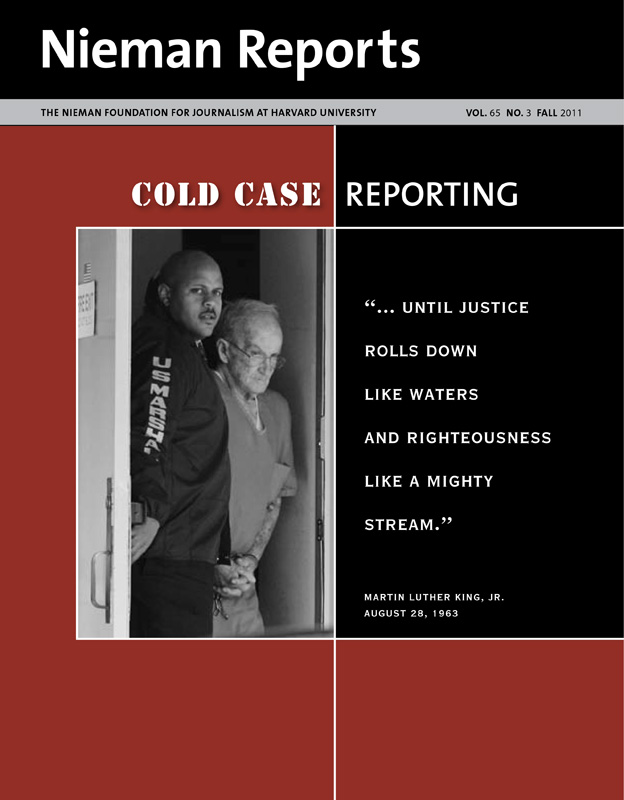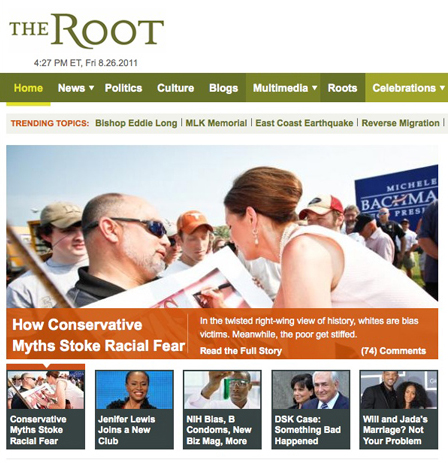
Cold Case Reporting
Cases unheard. Justice denied. These words fit many crimes committed with racial intent a half century ago. Now reporters burrow into forgotten files, locate witnesses, track down suspects, publish what they find—and write for us about their work that in some cases is resulting in justice finally being served. Journalists then explore how stories about black America are told today. Next, our focus turns to news reporting in a time of revolutionary change in Arab nations. Intriguing essays then transport us from Iran to Indonesia, from financial collapse to consensus building, from envisioning computers replacing journalists to reporting from war’s frontlines.
When Harvard University professor Henry Louis Gates, Jr. and The Washington Post Company CEO Donald Graham launched The Root in 2008, their ambitions were anything but modest. "We wanted to create a daily black national—indeed, international—magazine, a medium on the Internet that would link black communities throughout the country, across class and regional lines, and throughout Europe, Africa, the Caribbean, and South America," Gates explained. "Imagine the powerful impact that the Amsterdam News and The Chicago Defender and [W.E.B.] Du Bois's The Crisis had in their day as shapers of black public opinion on working class black folks as well as the elite."
RELATED ARTICLE
“Familiar Patterns of Minority Exclusion Follow Mainstream Media Online”
- Jean Marie Brown Three years later, it's too soon to put The Root—or its online competitors such as BlackAmericaWeb.com, theGrio, and Black Voices—on a par with those legendary publications, which evolved during the age of segregation to serve a largely isolated black community often either ignored or insulted by the mainstream press. But in the age of Barack Obama and an emerging, increasingly tech-savvy black elite, The Root has become what Gates describes as a "well-edited, thoughtful, ideologically cosmopolitan digital publication." It is a place where black folks can talk to each other, and others can listen in on their virtual conversation.

The Root, which covers politics, celebrities and a host of topics, attracts 1.5 million unique visitors a month.
Hosting such a dialogue is no small achievement, especially when the dialogue is so rich. Joel Dreyfuss, The Root's managing editor since 2010, won't divulge financial details, but he says the site recently has been averaging about 1.5 million unique visitors per month. In addition to a small full-time staff, it has freelance contributors including such wildly divergent African-American voices as liberal University of Maryland Law professor Sherrilynn Ifill and John McWhorter of the conservative Manhattan Institute, and a host of veteran journalists. There are also strong emerging voices, such as Helena Andrews, author of an essay collection entitled "Bitch Is the New Black," and a bevy of grizzled old hacks, such as myself. I write a weekly commentary called RightWatch that chronicles the ups and downs of conservative politicians.
The range of topics The Root addresses can be dazzling, ranging from hard-core politics to fluffy entertainment. On the day in July when The Root launched a new design for its site, for example, the lead story was an interview with rhythm and blues singer Kem, a former drug addict now battling to provide effective, non-prison treatment for drug problems. Next up was a provocative commentary questioning whether a promising new treatment for HIV should be distributed primarily to those who have already been infected or those seeking to prevent infections. Another commentator lamented Republican presidential candidate Michele Bachmann's criticism of payments to black farmers who had been discriminated against by the U.S. Department of Agriculture, and The Atlantic's Ta-Nehisi Coates pointed out that James Murdoch, heir apparent to Rupert Murdoch, was an investor in a recording company "responsible for some of the best hip-hop music of our time." A few days later, the site featured a provocative essay on whether blacks tip less than whites.
The Cost of Reporting
That diversity of voices and subject matter is The Root's greatest strength—and it can be its greatest weakness. Like most black-oriented websites, The Root relies heavily on commentary and analysis, not originally reported stories, which are much more expensive to produce. Dreyfuss concedes that he would like to run more originally reported stories, but that "financial restraints" and a heavy dependence on freelancers stand in the way. That means that in dealing with major events such as the debate over the federal budget and debt ceiling the site more often plays the role of recycler of news than of breaker of news. To make up for the shortage of original journalism on the site, The Root sometimes falls back on a hoary journalistic contrivance—the list. The Root 100, a compilation of influential African Americans between the ages of 25 and 45, mimics Ebony magazine's annual enumeration of the most influential blacks.
And then there is a broader question of identity. The Root, like theGrio and Black Voices, is black-managed but not black-owned. It benefits from being a part of the Washington Post Company's stable of websites, which include Slate and Foreign Policy. "We coexist amicably," says Dreyfuss. "We share resources like technology and accounting and some of the larger sites drive some traffic to The Root." But it also means that The Root and many of its competitors are susceptible to the same economic pressures that have triggered an implosion in mainstream, publicly traded media companies, including the Post. So far, there has been no effort by The Root's white owners to restrain its decidedly black viewpoint.
The Root and its competitors have clearly established that there is both an audience hungry for impassioned black viewpoints on the Web and a pool of talented writers eager to provide such material. As Gates puts it, paraphrasing Du Bois, his hope for The Root has been to "lift the veil" by echoing "the sort of open and free intraracial conversations that black people routinely have in barber shops or beauty parlors, at family reunions or in their own homes." The challenge now is to find the resources needed to expand that audience by producing more original journalism while retaining its authentic black voice. If The Root pulls that off, it will deserve to be mentioned along with the storied publications that Gates and Graham evoked when they launched it.
Jack E. White, a 1977 Nieman Fellow, writes a weekly commentary, RightWatch, for The Root. For 29 years he worked at Time magazine, as a columnist, correspondent and editor.
RELATED ARTICLE
“Familiar Patterns of Minority Exclusion Follow Mainstream Media Online”
- Jean Marie Brown Three years later, it's too soon to put The Root—or its online competitors such as BlackAmericaWeb.com, theGrio, and Black Voices—on a par with those legendary publications, which evolved during the age of segregation to serve a largely isolated black community often either ignored or insulted by the mainstream press. But in the age of Barack Obama and an emerging, increasingly tech-savvy black elite, The Root has become what Gates describes as a "well-edited, thoughtful, ideologically cosmopolitan digital publication." It is a place where black folks can talk to each other, and others can listen in on their virtual conversation.

The Root, which covers politics, celebrities and a host of topics, attracts 1.5 million unique visitors a month.
Hosting such a dialogue is no small achievement, especially when the dialogue is so rich. Joel Dreyfuss, The Root's managing editor since 2010, won't divulge financial details, but he says the site recently has been averaging about 1.5 million unique visitors per month. In addition to a small full-time staff, it has freelance contributors including such wildly divergent African-American voices as liberal University of Maryland Law professor Sherrilynn Ifill and John McWhorter of the conservative Manhattan Institute, and a host of veteran journalists. There are also strong emerging voices, such as Helena Andrews, author of an essay collection entitled "Bitch Is the New Black," and a bevy of grizzled old hacks, such as myself. I write a weekly commentary called RightWatch that chronicles the ups and downs of conservative politicians.
The range of topics The Root addresses can be dazzling, ranging from hard-core politics to fluffy entertainment. On the day in July when The Root launched a new design for its site, for example, the lead story was an interview with rhythm and blues singer Kem, a former drug addict now battling to provide effective, non-prison treatment for drug problems. Next up was a provocative commentary questioning whether a promising new treatment for HIV should be distributed primarily to those who have already been infected or those seeking to prevent infections. Another commentator lamented Republican presidential candidate Michele Bachmann's criticism of payments to black farmers who had been discriminated against by the U.S. Department of Agriculture, and The Atlantic's Ta-Nehisi Coates pointed out that James Murdoch, heir apparent to Rupert Murdoch, was an investor in a recording company "responsible for some of the best hip-hop music of our time." A few days later, the site featured a provocative essay on whether blacks tip less than whites.
The Cost of Reporting
That diversity of voices and subject matter is The Root's greatest strength—and it can be its greatest weakness. Like most black-oriented websites, The Root relies heavily on commentary and analysis, not originally reported stories, which are much more expensive to produce. Dreyfuss concedes that he would like to run more originally reported stories, but that "financial restraints" and a heavy dependence on freelancers stand in the way. That means that in dealing with major events such as the debate over the federal budget and debt ceiling the site more often plays the role of recycler of news than of breaker of news. To make up for the shortage of original journalism on the site, The Root sometimes falls back on a hoary journalistic contrivance—the list. The Root 100, a compilation of influential African Americans between the ages of 25 and 45, mimics Ebony magazine's annual enumeration of the most influential blacks.
And then there is a broader question of identity. The Root, like theGrio and Black Voices, is black-managed but not black-owned. It benefits from being a part of the Washington Post Company's stable of websites, which include Slate and Foreign Policy. "We coexist amicably," says Dreyfuss. "We share resources like technology and accounting and some of the larger sites drive some traffic to The Root." But it also means that The Root and many of its competitors are susceptible to the same economic pressures that have triggered an implosion in mainstream, publicly traded media companies, including the Post. So far, there has been no effort by The Root's white owners to restrain its decidedly black viewpoint.
The Root and its competitors have clearly established that there is both an audience hungry for impassioned black viewpoints on the Web and a pool of talented writers eager to provide such material. As Gates puts it, paraphrasing Du Bois, his hope for The Root has been to "lift the veil" by echoing "the sort of open and free intraracial conversations that black people routinely have in barber shops or beauty parlors, at family reunions or in their own homes." The challenge now is to find the resources needed to expand that audience by producing more original journalism while retaining its authentic black voice. If The Root pulls that off, it will deserve to be mentioned along with the storied publications that Gates and Graham evoked when they launched it.
Jack E. White, a 1977 Nieman Fellow, writes a weekly commentary, RightWatch, for The Root. For 29 years he worked at Time magazine, as a columnist, correspondent and editor.


